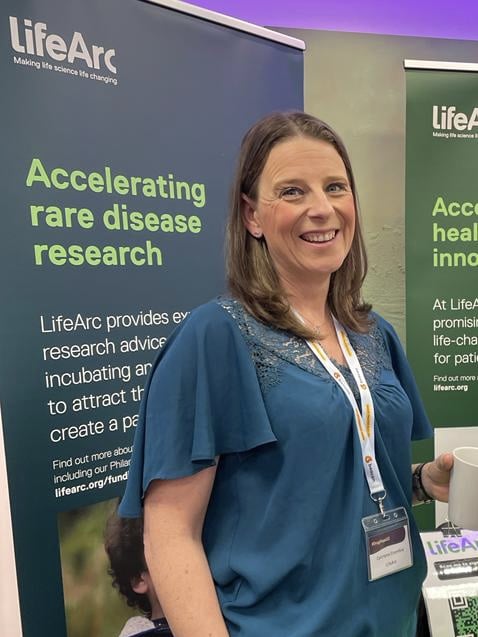LifeArc has awarded £3 million to de-risk and accelerate around 30 innovative early research projects investigating the diagnosis and treatment of a wide range of rare diseases at six UK universities.
University College London, University of Birmingham, University of Edinburgh, University of Manchester, University of Newcastle and the University of Sheffield have each been awarded a £500k LifeArc Pathfinder Award. The Pathfinder Award provides early-stage grant funding for researchers to run early studies testing novel scientific ideas for diagnosing and treating a wide spectrum of rare diseases, enabling them to achieve the data and evidence hurdles needed to leverage future funding.
Samira Fakire, Business Manager at LifeArc commented: “We have created this pump-prime funding to help researchers get innovative approaches off the ground, test the theories and collect the evidence needed to move forward to the next stage of research and funding. We also hope that the award will encourage more researchers to move into the rare disease space and promote the development of a translational culture – pushing more discoveries from the lab into meaningful real-world benefits for patients.”
The six universities were chosen by LifeArc for their excellence in both rare disease research and clinical care. They are each undertaking their own selection process to allocate the funds to different research approaches.
University of Birmingham
Professor Tim Barrett told us: “The Centre for Rare Disease Studies at the University of Birmingham works closely with other organisations from Birmingham Health Partners; Birmingham Children’s and Women’s Hospital and University Hospitals Birmingham.
“Our uniquely diverse patient population, and strength in partnership ensures that we are in the best possible position to drive forward research in rare diseases to accelerate progress and ultimately improve patients’ lives.”
Projects include:
- Investigating the effectiveness of Nanopore sequencing, a new type of genome sequencing, which could help in the diagnosis of rare genetic discorders
- Investigating whether a type of immune cell, known as gamma-delta T cells can be used to develop an effective therapy for liver cancer
- Studying whether a new medical device could help people with the rare condition primary sclerosing cholangitis (PSC) where the immune system attacks itself
- Studying a genetic therapy that could prevent damage to the DNA of nerve cells that occurs as rare neurodegenerative diseases progress
- A study aiming to improve the health of patients with rate childhood onset of neurodegeneration
University College London
Dr Jane Kinghorn, Director, Translational Research Office told us: “UCL’s close link with our partner hospitals and patients gives our academics a real sense of urgency in developing solutions to some of the most severe and debilitating rare disease conditions.
“Our research is very diverse with over 100 clinical academic research groups investigating more than 350 rare diseases. This pathfinder award gives us a tremendous opportunity to support early studies aimed at testing solutions for rare diseases, and by introducing them to the wider translational ecosystem, move promising solutions towards the clinic faster.”
UCL is currently evaluating 19 applications, with the view to funding five, for therapies and diagnostics at an early stage of development spanning a range of rare disease.
University of Edinburgh
Professor Stuart Forbes told us: “We are excited to be working with LifeArc in the important area of developing therapies for rare diseases. This will enable researchers from the University of Edinburgh to focus their excellent research against these difficult medical challenges. By working together and finding common approaches we will seek to have maximum impact and develop new therapies for patients with rare diseases where there is currently such unmet need.”
University of Manchester
Professor Neil Hanley told us: “Rare conditions are an important theme in our Manchester NIHR Biomedical Research Centre, and we are excited about putting this investment to best effect. This LifeArc award will centre around pushing our fundamental science through to real benefits for people.”
Projects include:
- Using novel ERK5 inhibitors to treat metastatic osteosarcoma.
- Characterising an ultra-rare acute febrile encephalopathy.
- Understanding neuronopathic lysosomal storage diseases and developing treatment biomarkers.
- Treating cardiac arrhythmias in an inherited arrhythmia syndrome.
- Testing novel treatments for hereditary spastic paraplegia type 82.
- Evaluating cancer risk in rare familial disease
- Curing genetic kidney malformations using HPSC-derived kidney organoids.
- Identifying therapeutic targets for RAC1-related neurodevelopmental disorder.
- Gene therapies for rare diseases in NHS England
University of Newcastle
Professor David Jones told us: The Newcastle Centre for Rare Disease benefits from over 50 years of excellent research and clinical care across a broad range of rare diseases. Uniting over 120 experts from Newcastle University and the Newcastle-upon-Tyne Hospitals NHS Trust, we think a ‘beginning to end’ approach is the only way to address the many unmet needs for rare disease.
“We therefore work across disease areas and disciplines, spanning basic science to advanced therapeutics, diagnostics to integrated care, health research methods to policy. We were delighted to receive this pathfinder funding and are now notifying our top-ranked proposals (from a total of 36 diverse applications) which will advance translational research in rare neurodegenerative, renal, immune and neuromuscular diseases, opening the prospect of more effective and personalised management for patients.”
University of Sheffield
Professor Mimoun Azzouz told us: “The LifeArc Pathfinder scheme for rare disease is an exciting initiative. I am delighted to learn that Sheffield is selected for one of these awards. The funds will definitely pump-prime translational projects with impactful potential and bring future beneficial outcomes for patients with rare conditions. I am also pleased that the Award helped us to identify very promising rare disease research happening at the University of Sheffield.”
Projects include:
- Using ex vivo imaging to measure drug efficacy to screen potential new effective treatments for Glioblastoma – a rare cancer with median survival of 15 months (PI: Danson and Wells)
- Developing a clinical translational pipeline for the development of therapies for Hereditary spastic paraplegia (HSP) associated with mutations in SPG7 and SPG4 (PI: Mortiboys)
- Pre-clinical assessment and target validation of first-in-class compounds to treat incurable gliomas (PI: Collis)
- Developing a gene therapy for HNRNPU related neurodevelopment disorder, a rare genetic disease which leads to developmental delays and seizures (PI: Wilson)
- Using AI for the automated diagnosis and management of salivary gland cancers (PI: Khurram)
- Determining the therapeutic benefit of restoring axonal transport in amyotrophic lateral sclerosis (ALS) (PI: de Vos)
These awards form part of LifeArc’s wider commitment to driving advances for people living with rare diseases, with more announcements and funding opportunities expected this year. Keep an eye on our funding pages for more information.
Media contact
Hannah Severyn
Head of Media and PR at LifeArc



